You’re Welcome.
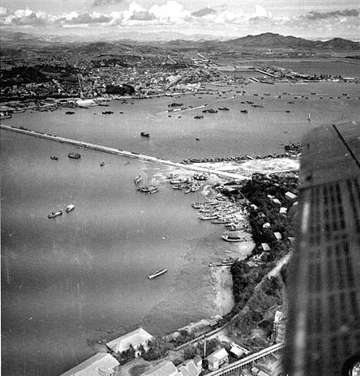 Today is Liberation Day, at least for those of us on this side of the International Date Line. And because we’ve recently been on the subject of things that happened at Incheon, I thought I’d mention that the Incheon landing pictured here took place on September 8, 1945, when the United States Army arrived to liberate South Korea for the first time … from Japanese rule. You did hear that, right? Funny how no one ever talks about it.
Today is Liberation Day, at least for those of us on this side of the International Date Line. And because we’ve recently been on the subject of things that happened at Incheon, I thought I’d mention that the Incheon landing pictured here took place on September 8, 1945, when the United States Army arrived to liberate South Korea for the first time … from Japanese rule. You did hear that, right? Funny how no one ever talks about it.
If you’d like to know more, I strongly recommend the accounts of PFC Mario “Ben” Benedetto and PFC Milo Smith, who were there to accept the Japanese surrender.
Among other fascinating finds is this scanned image of a handwritten letter from the leader of one of Korea’s radical labor unions of the day (o, how little times change), which I’ll let you read for yourself.
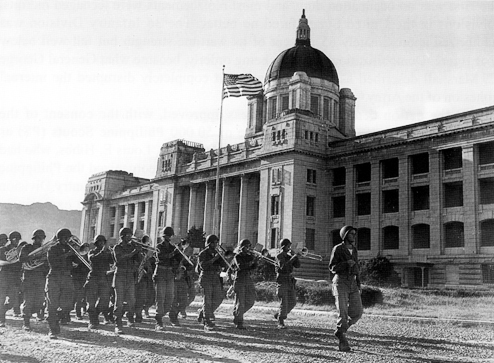
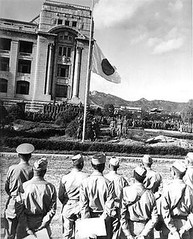 The aspirational welcome hits a sour note when it demands the execution of the Japanese prisoners. As PFC Smith described it:
The aspirational welcome hits a sour note when it demands the execution of the Japanese prisoners. As PFC Smith described it:
The first day a flier from some Korean organization was passed out to all of us asking us to kill and behead the Japs. The Koreans really hated them. Of course we didn’t do it. We disarmed the hundreds of soldiers and marched them to ships to be loaded and sent back to Japan. (Can you imagine if the tables were turned what would happen to us?)
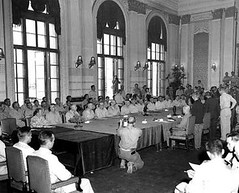 Panning out for the bigger picture isn’t as easy. The needle of reliable information that does exist is buried under a mountain of Kimsoft crap. Here’s a brief take from the official U.S. Army history:
Panning out for the bigger picture isn’t as easy. The needle of reliable information that does exist is buried under a mountain of Kimsoft crap. Here’s a brief take from the official U.S. Army history:
Although the US. Army saw no action in Korea during World War II, the 6th, 7th, and 40th Infantry Divisions arrived there in September and October 1945 to occupy the southern portion of the country and assist in the demobilization of the Japanese Army. An agreement with the Soviet Union had divided the former Japanese colony at the 38th Parallel. The Korean contingent for a short time remained at three divisions but soon dropped to two, the 6th and 7th Infantry Divisions. Following establishment of an independent South Korean government in 1948, the Far East Command inactivated the 6th and moved the 7th to Japan, leaving only a military advisory group in Korea.
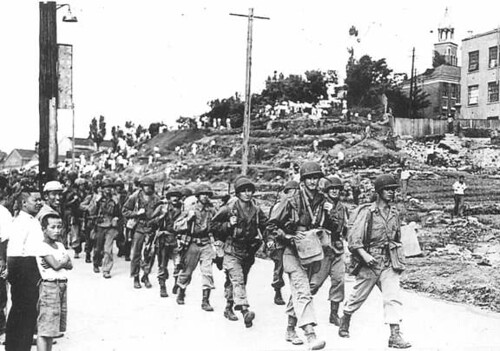
For a better take on what the occupation forces encountered when the Army first arrived, I recommend Gordon Cucullu’s “Separated at Birth.” I’ll give the last word to Ben Benedetto:
Today they are a great country, a far cry from the muddy dirt roads, the oxen driven wagons and the ditches at the side of the road which were used for latrines. We helped them a great deal and slowly, as they progressed, we were less appreciated. I don’t know if it was worth going there but I guess it had to be done.
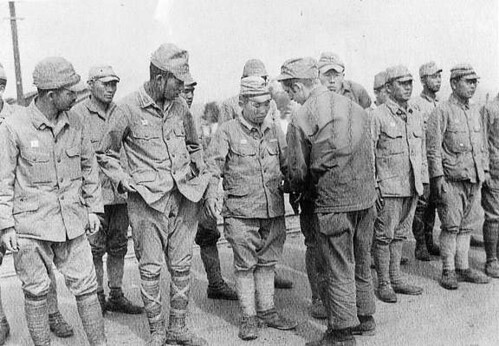
In fact, I think it was worth it, but I can certainly understand why he would wonder.
in regard to saying thanks to america, i have no problem with that. but lets be honest here. american didn’t defeat the evil japaneses for the sake of liberating korea. liberating korea was just happenstance. a by-product. there’s a lot more one can say.. but i’ll just leave it here.. thanks america.
Let’s be honest. South Koreans didn’t fight and die to protect another imperfect democracy against tyranny in Vietnam. T’was mere happenstance — South Korea buying America’s favor, you know. Ditto Iraq (where Korea has risked nothing, in fact).
On my country’s behalf, please allow me to discharge all obligations of heartfelt gratitude to any of the dead, or those who volunteered to serve in unpleasant places:
Glad that’s over with.
Fortunately, I don’t have the prosperity of my country, its independence, or its salvation twice over to explain away. Faced with those facts, I’d need to get an entire revisionist movement — complete with distorted history texts — to be such an accomplished ingrate.
in shelley’s frankenstein, frankenstein ultimately turned on the scientist..its creator.. there’s some irony there.. i’m not too sure if the case and relationship that runs between korea and u.s doesn’t run in parrellel..
joshua, tell me if you think or know as a fact that the liberation of korea was not happenstance.. was america aware of its very existence ? lives lost ? american lives were lost to combat the communists.. as it’s losing lives to fight terrorism this very moment.. america couldn’t have cared less korea and didn’t. even wanted to invade korea itself but dealt it to japan in exchange for the phillipines. not that there’s anything wrong with that. as a nation, you are at liberty to act in the best interest of your country. regardless of what afflictions it might have on the inhabitants of said place.
oh sure.. the lives of soldiers fighting for one’s nation (especially american, because americans value american lives *especially soldiers*)are worth tenfold or even thousand times in value than some poor child in the middle of iraqi desert. what’s the body count ? u.s soldiers ? how many more before the public demands there return home.. but has anyone asked: how many iraqi civlian lives lost ? before anyone has empathy, sympathy for the plight of ordinary iraqi ? do you honestly believe that the people of iraq will say in fifty years from now, thank you, thank you america?
btw.. didn’t know that you were or are such an accomplished historian.
Wow Ghola,
You’re comparing what we did for the Koreans with what we’re currently doing in Iraq. No wonder your thank you is sarcastic. Let me guess…you’re a college student…studying at Yonsei University…no doubt a history major.
By the way. You’re welcome.
My Uncle died in the Korean War, my grandfather was wounded in the same war, and I’ve served 5 years in your country defending it.
cucullu was on c-span tonight. it was a re-run from 04 though.
Well, Ghola, I guess if you can’t win the argument, you can always try to change the subject. The point I made in the post and my comment is that Korea owes its existence, liberty, and prosperity to the United States, and yet on those rare occasions it manages a word of thanks, can only do so through clenched teeth. You would say that because the United States shared an interest in containing tyranny and misery everywhere, it would be written off as a selfish act. The same logic would hold that love is a moral irrelevancy in marriage because both spouses share interests in sharing housing and child rearing.
If the fact that the two countries once had a unity of interests diminishes that, then please don’t have the gall to call Korea an American ally or demand eternal protection as an entitlement. True alliances are based on a unity of interests, which the current government of Korea has done much to unilaterally abrogate. Without a unity of interests, nations never bleed for each other. Even when their interests do unite, history affords very few examples of one nation’s altruism toward another that equal America’s toward Korea.
Deny that.
no, i wasn’t comparing.. you missed it completely. no, it wasn’t sarcasm. you must learn to read between the lines better. in trumans rally cry to enter the war “we must contain the communists” not, we must defend south korea. no, i’m not a history major nor a college student.. especially at yonsei. they’d never let me in. but that comment ” btw, i didn’t know you were or are such an accomplished historian” is an example of a very “sarcastic” remark.
I’d say “grudging” is more like it.
Ghola,
I don’t know, but that looks an awful lot like a comparison to me… You start off by talking about Korean, and then you bring up the Iraq situation to back up your position…
So, because Truman didn’t say “we must defend the South Koreans,” the still defended South Koreans do not need to acknowledge or be grateful that they were defended? The American Civil War wasn’t fought to end slavery. The original intent was to keep the South from seceding. Abolishing slavery became a sub-reason later on to give the North a moral ground and keep Europe from intervening, which would have resulted in a divided U.S.
I guess because the U.S. fought the Japanese in World War II as a result of the Pearl Harbor attack and not to liberate the Korean colony, it is not necessary to acknowledge that Korea’s independents was a result of U.S. efforts.
I don’t know why I even bother to continue this. With the text books floating around here in S .Korea, the students are probably being taught that it was Kim Il Sung who liberated the Korean Peninsula anyway.
Just so that second paragraph doesn’t confuse anyone. The point I was making was that even though the original reason for the U.S. Civil War was not to end slavery; it still resulted in an end to slavery and is therefore credited for ending slavery.
It’s strange that Koreans see the intent of the U.S. in fighting the Japanese in World War II as justification for not crediting the U.S. for the resulting independence of Korea. That’s like not crediting Dr. Alexander Fleming with the discovery of Penicillin because he didn’t intend to discover it.
it’s kind of like an anorexic looking into the mirror and seeing a very fat person. it’s a disease.
cody, you’re reading too much into what i said. it’s ok to draw your own conclusion as to what it meant but, please don’t put words into my mouth.
“unity of interest” “altruism”, can they go hand in hand ? do they ?
japan tried but never succeeded in conquering korea. history goes way back.. the crux of it all is this: why was japan able to defeat korea in the 20th century ? how ? if you can answer that… you’ll understand me a whole lot better.
“Liberating Korea” or “defending democracy in Vietnam” does not nor would not compell the political will of a country to sacrifice to the extent the USA did when there was a greater issue that happened to involve the formers. Just because the formers were not the primary motivators doesn’t mean there were no altruistic motives. But this fact has been deceitfully exploited by the far left to say that motives were only selfish and the USA doesn’t care about Koreans. Quite the contrary.
The point here is that the USA has been falsely domonized by the Far Left in S Korea, who is distorting everything possible to cast the USA in the worst of all light. This is sick and wrong. The USA has made plenty of mistakes and there are plenty of morons in the USA (like any country), but it has contributed more to the development of humankind and human rights and freedom than ANY OTHER COUNTRY. Not because of anything to do with race, ethnicity, or nationalist sentiment, but because of enough peoples belief in the UNIVERSAL principles embodied in it’s foundation.
Ghola, I don’t think America is wanting people to worship it or believe it is without faults. Every country engages in realpolitik, but altruism exists too. Your prejudice is showing.
“japan tried but never succeeded in conquering korea. history goes way back.. the crux of it all is this: why was japan able to defeat korea in the 20th century ? how ? if you can answer that… you’ll understand me a whole lot better.”
Japan did not conquer Korea? I am hard pressed to think of a country on the planet so completely dominated as Korea was by Japan, considering the relatively small amount of violence used, and total lack of significant battles or significant resistance. Without the US, there is little doubt that Korea would have been part of the Japanese Empire forever.
I agree with Ghola’s initial point, to an extent. A lot of you seem to be confusing attitudes towards the US liberation of Korea from Japan with the US defense of the ROK against North Korean/Soviet aggression five years later.
If the USA had really given a stuff about Korea’s independence, it might have acted earlier to combat Japanese aggression in Asia and fulfilled its treaty obligations (see 1882 Chemulpo Treaty). At the time, however, we were pursuing our own distinctly imperialistic activity in Central America and elsewhere, and we ceded influence in East Asia for the most part.
Once the US had been prodded into action by Japanese attacks on our people in Hawaii and our interests in the Philippines, and then defeated that totalitarian regime, Korea’s independence was essentially a side-effect. Our half-hearted reconstruction efforts there only underline our indifferent attitude at the time.
matt,
Without the US, there is little doubt that Korea would have been part of the Japanese Empire forever. i agree wholeheartedly with what you said. but can you go a little deeper in your thinking ? don’t you think, without the u.s, emperial japan wouldn’t have come into existence in the first place ?
and perhaps it would have better off for the entire world and especially korea, had korea just faded away from history… better to die with a little dignity than to live in perpetual shame of defeat, i guess. but guess what.? we didn’t disappear. divine intervention ? will of god ? i’d like to think so…
as long as koreans exist, we will pay the japanese our debt. we always pay our debt..
cody, if i may sk you a question. when is the great emancipation day celebrated in america ? when is the day when over 10 million americans of african ancestry thank the people of u.n that they are no longer slaves ?
“when is the great emancipation day celebrated in america ? when is the day when over 10 million americans of african ancestry thank the people of u.n that they are no longer slaves ?”
The closest thing we used to have was Lincoln’s birthday, but that got folded into George Washington’s birtday for all practical purposes even in Illinois. As for “americans of african ancestry” thanking ANYONE, you’ve got to be kidding. No african ancestry American will ever acknowledge the sacrifice of whites in the Civil War because it would detract from the “victimhood” mythology Jesse Jackson, Al Sharpton, etc. like to propagate.
The comparison to African-Americans is risible. African-Americans are Americans. Beneath all the debates about federalism were once-disputed views of their rights and entitlements under the U.S. Constitution. We celebrate the all-too-gradual extension of those rights to all each year on Martin Luther King, Jr. Day. Leave aside matters of semantics and identity politics. Citizens are entitled to the rights of citizenship and the benefits paid for by their taxes.
Here is the essence of the problem, as well as the greatest psychological barrier to the true independence of Korea — the idea that Koreans are also entitled to protection at the expense of U.S. taxpayers. Perhaps one does not owe gratitude to one’s fellow man for being afforded his rights, but ingratitude for discretionary acts of salvation is not easily forgiven. Ours is a voluntary alliance that rests on a unity of interests, to be sure, as well as the the good will of both peoples. Americans are troubled by the idea that another country’s sense of entitlement to our blood and treasure cohabitates so comfortably with its intentional fanning of of ill will toward us. When you strip away that good will, the true value of our shared interests is laid bare for close scrutiny. And when South Korea’s expressed policy is holding up one end of the Axis of Evil, that unity of interests isn’t looking so good.
Yes, good will comes at the modest price of some appreciation for our sacrifice of 38,000 lives, billions of dollars, and countless birthdays spent away from our kids. Those sacrifices have brought Korea peace, freedom, prosperity, and yes, independence. Yet our sacrifices are dismissed. Yet we are blamed — to cite just one of the more ridiculous examples — for brokering a peace treaty way back in 1905, before the Great White Squadron, before the U.S. was a world power with a two-ocean Navy, nearly a decade before the Panama Canal, and 14 years before the first major expression of Korean popular discontent with Japanese occupation.
A better question is why this even matters. It’s tempting to dismiss this entire discussion as sentimental, but sentiment elects leaders who set policies. Americans who watch Korea carefully and craft its policies have never been in such a foul mood, and the alliance’s survival is by no means assured, no matter how the next elections go. (How ironic if Korea elects a conservative government in 2007, only to see the United States elect Democrats on a platform of retreating from entangling foreign alliances in 2008.) The alliance has lost American conservatives, probably for good, and with them, its political base. Anti-Americanism has opened the minds of the alliance’s once-stalwart backers to questions about the degree to which it still serves our interests. They weren’t asking those questions five years ago.
I happen to believe that some U.S. presence in Korea still serves U.S. interests, although I don’t personally think that presence should continue to include ground forces beyond those needed to protect our air bases. Korea has been anti-American for a while now, but for a long time, America didn’t really notice, and the Korean government was still playing back the old familiar mantras of eternal friendship. That has changed. Today, the account of mutual good will is so overdrawn, and the interests have diverged so far, that one wonders what cohesive forces will still hold the alliance together five years from now.
I am a Korean-American and it kills me whenever I see the current SK administartion and govt (not GNP) continue to destroy what used to be one of the greatest alliances of this century. I have placed all my hope and faith in the belief that the next SK administration will restore the alliance to its highest level and then gather all the radical monkeys in the country and send them to the gulags up north. If such a scenario does not occur, the people of SK deserve to unite with NK and become another hopeless state.
Seriously Ghola, what are you talking about? How did the US cause the rise of Empirial Japan again?? Is this in one of those new Korean history books?
Well said Joshua. My original reason for bringing up the Civil War was merely to show that original intent does not discount or shame the results.
I don’t know how it was twisted into comparing African Americans and Koreans.
hope, sending them to the gulags for holding different political views ? what make you any different from kim jong il, then.? you are as evil as he. haven’t you learned anything from living here in america ? you should rename yourself as doom and gloom.
Ghola,
Again, what are you talking about?
cody, i’m afraid i have neither the capacity or will to elucidate things for you. apologies.
garbage in, garbage out…
I don’t know, maybe if your post was in coherent English it could be understood… thanks for playing though!
“without the u.s, emperial japan wouldn’t have come into existence in the first place ?”
What a ridiculous piece of tripe. You’re trying to blame the rise of Japan on the US?!?
Ghola…You are a most articulate spokesman. I imagine you’d be just as strong a debater in Japanese or Russian, but we needn’t belabor what could have happened but didn’t. America’s fight against Japan and America’s stand against communism benefited many, especially Korea. Koreans these days are making a serious mistake in buying into leftist interpretations of the world and its history. Culture, nationalism, race and envy are as powerful as they are enticing, so be careful. (Watch “Triumph of the Will”–available on dvd–and listen to the appeal of The Fatherland and watch the fierce automatons goose step, as they do in Pyongyang. Be careful. But I sense that you do indeed acknowledge at least some gratitude to the US. Prosperity is wonderful, freedom even more so. If you disagree, head up north and live there. There will be no debates on whether the US is good or not and even better, there will be no Americans. In my five years in Korea I met many people who liked me despite my being a yang-nom, but I met more than a few insults,too, because I was a yang-nom. You’re a better man for not attending Yonsei and much much better for not attending SNU (where everyone is so smart they couldn’t possibly be wrong about anything, especially leftism and anti-americanism. I used to think I was pretty smart when I was in college too–in fact, I thought I knew everything!)
All the Best,
Avidyananda
Some excellent comments here. I think it is very sad Korea doesn’t acknowledge America’s and infact the WORLD’s effort in keeping SK free. I don’t hate Korea, I lived there for 3 years and it is plain to see that Korea would have had no chance without help from the outside world whether it be militarily or monetarily. It doesn’t mean Korea must bow down to other countries, but a bit of a “Gee thanks guys, you really are good mates” every now and again would be nice.
I just wasted the time it took to read the post above. Ghola, you are one messed up dude. You do double talk better than Clinton. You are an ungreatful child from an ungreatful country. I pray that USFK will pass on soon. Your country has nothing to offer except kimchi. Your leaders and people understand little about todays event and remember nothing of yesterdays. Americans are good at not understanding cause/effect, but the Koreans have us beat, hands down. [edited] I will smile when the USFK is gone. I will be a bit sad when we hear the NORKS have done it again. But, when i read what you said — not so much. We helped your sorry ass when no one else gave a damn—bottom line.